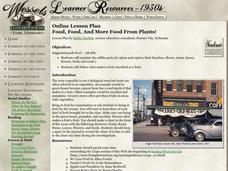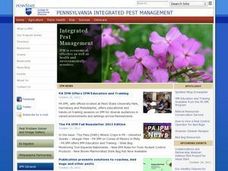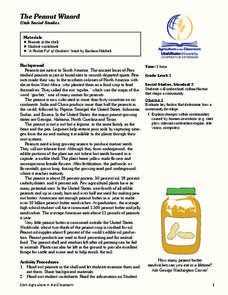Australian National Botanic Gardens
Aboriginal Plant Use in South-Eastern Australia
The Aboriginal people of Australia survived for over 40,000 years by using the plants that grow in the bush for food, medicine, tools, and utensils. Introduce young botanists to the wonders of the Outback with a 25-page packet that...
Curated OER
First Nations Plants and their Uses
Students identify the uses of plants by researching Native Americans. In this First Nations culture lesson, students identify the First Nations coastal people of British Columbia and their use of plants such as seaweed, bark and moss....
Curated OER
Food, Food, And More Food From Plants!
Students examine the edible parts of a plant and explore their function. They define what makes a fruit classified as a fruit. They create a sketch or map or photo of a 1930s farm and justify their plant selections.
DocsTeach
Sequencing from Seeds to Harvest
Explore the farm to table experience in a fast-paced lesson on gardening. The activity uses image sequencing to help young scholars understand the process of growing food from seed to harvest. Academics also participate in group...
Curated OER
Weeds-Wild and Wonderful
Students compare and contrast weeds and desirable plants. They explore the ways which their ancestors used weeds and depended on them for food and other household necessities.
Curated OER
Where Did Foods Originate? (Foods of the New World and Old World)
What do papayas, peanuts, pineapples, and potatoes have in common? Why, they are foods explorers brought back to the Old World. Young researchers use the Internet to investigate how New World explorers helped change the Old World's diet....
Curated OER
A Priceless Collection
Pupils read about and discuss life of Russian geneticist Nikolai Vavilov, define terms related to field of genetics, complete worksheets, conduct seed experiments, observe and record results, and locate seed banks on world map or globe.
Curated OER
Planning a Railroad Online Lesson
Young scholars design a train route using a topographical map. In this historical and spatial thinking lesson plan, students must plan a route through the Sierra Nevada mountains that a train could physically travel. Links to printable...
Curated OER
The Peanut Wizard
Students read and discuss information regarding George Washington Carver and how the peanut became cultivated in the southern colonies of the United States. In this George Washington Carver lesson, students develop vocabulary that...
Curated OER
Building on the Land
Ninth graders study how cities affect the environment and design an ecologically-sound city. They focus their study on the benefits and constraints of life on the Northern Great Plains.
Curated OER
The Peanut Wizard
Students investigate the history of the peanut. In this social studies lesson, students read the book A Pocket Full of Goobers and examine the a peanut. Students discuss the peanut's characteristics and take notes on an article about...
Curated OER
JUST A MATTER OF TIME
Students recognize the dynamic changes in themselves and in agriculture that have occurred through the years. They are shown pictures of a baby or students are asked to think of their little brothers or sisters or themselves in...
Curated OER
How has rice been produced throughout history?
Fourth graders research rice history. In this rice history lesson, 4th graders discover the farming methods used to cultivate rice. They read about the role of rice in many cultures.
A&E Television
History.com: History on a Plate: How Native American Diets Shifted After European Colonization
For centuries, Indigenous people's diets were totally based on what could be harvested locally. Then white settlers arrived from Europe. Native people pass down information - including food traditions - from one generation to the next...
Other popular searches
- Edible Plants and Flowers
- 8 Edible Plants
- Non Edible Plants
- Edible Plants Worksheet
- Science, Edible Plants
- Family of Edible Plants
- Edible Plants Corn
- Texas Edible Plants
- Edible Plants Survival
- Edible Plants of Texas
- Edible Plants in Alaska
- Forest Edible Plants















